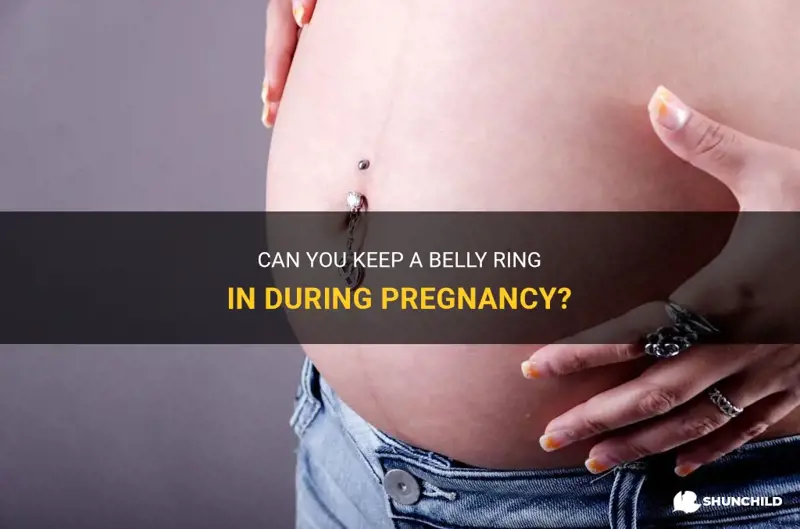
Pregnancy is a time when women experience numerous physical and emotional changes. From swollen feet to morning sickness, there are plenty of adjustments that need to be made to ensure a healthy and comfortable pregnancy. However, one question that often arises is whether or not it's safe to keep a belly ring in during pregnancy. This topic has sparked much debate, with some arguing that it's perfectly harmless while others caution against potential risks. In this article, we will explore the various perspectives on this issue and provide some key insights for expectant mothers who may be wondering about the fate of their belly rings during those precious nine months.
What You'll Learn
- Is it safe to keep a belly ring in during pregnancy?
- Are there any potential risks or complications associated with wearing a belly ring while pregnant?
- How can wearing a belly ring during pregnancy affect the healing process or stretching of the belly?
- Are there any special precautions or care that should be taken when wearing a belly ring while pregnant?
- What are the alternatives to wearing a belly ring during pregnancy, and are they safe?

Is it safe to keep a belly ring in during pregnancy?
Many women who have a belly ring may wonder if it is safe to keep it in during pregnancy. While there is no definitive answer, it is generally recommended to remove the belly ring for several reasons.
First and foremost, the growing belly during pregnancy can cause the piercing to stretch or tear. The belly button area becomes more sensitive and prone to irritation as the skin and tissues stretch to accommodate the growing baby. The pressure from the belly ring can worsen this irritation and increase the risk of infection.
Furthermore, wearing a belly ring during pregnancy can increase the risk of complications. The piercing can create a pathway for bacteria to enter the body, leading to infections such as cellulitis or abscesses. These infections can be potentially dangerous for both the mother and the baby.
In addition to the risk of infection, the belly ring can also pose a risk of injury. As the baby grows and moves, there is a possibility of the belly ring getting caught on clothing or other objects, which can cause pain and discomfort. In rare cases, the belly ring can even become embedded in the skin, requiring medical intervention to remove it.
For these reasons, it is recommended to remove the belly ring during pregnancy. However, every woman's body is different, and some may be able to safely keep their belly ring in without any issues. It is essential to consult with a healthcare provider for guidance on whether it is safe to keep the piercing during pregnancy.
If you do decide to remove the belly ring, it is vital to follow proper hygiene practices to avoid any complications. Clean the area with mild soap and water regularly to keep it clean and dry. Avoid touching the area unnecessarily to prevent any further irritation or infection.
Once the baby is born and the belly has returned to its pre-pregnancy state, it is possible to reinsert the belly ring if desired. However, it is essential to wait until the area has fully healed before attempting to repierce it to minimize the risk of complications.
In conclusion, it is generally advised to remove a belly ring during pregnancy due to the increased risk of infection, irritation, and injury. However, it is essential to consult with a healthcare provider for personalized advice based on your specific situation. Remember to prioritize your and your baby's health and safety during this special time.
Exploring the Normalcy of Fixed Splitting in Pregnancy: What You Need to Know
You may want to see also

Are there any potential risks or complications associated with wearing a belly ring while pregnant?
Many women choose to wear belly rings or navel piercings as a form of body adornment. However, when it comes to pregnancy, there are potential risks and complications that may arise from wearing a belly ring.
During pregnancy, a woman's body undergoes significant changes to accommodate the growing baby. As the belly expands, the skin around the navel stretches, which can put pressure on the belly ring. This pressure can cause discomfort, irritation, and even pain. Additionally, the increased blood flow to the belly during pregnancy can cause the navel area to become more sensitive, further exacerbating any discomfort caused by the belly ring.
Another potential risk of wearing a belly ring during pregnancy is the increased risk of infection. The skin around the navel is more prone to bacteria and other pathogens, especially as it stretches and becomes more vulnerable. Poor hygiene practices or irritation from the belly ring can provide an entry point for bacteria, which can lead to infections such as cellulitis or abscesses. These infections can be dangerous for both the mother and the baby if left untreated.
In some cases, wearing a belly ring during pregnancy can also increase the risk of complications during childbirth. The belly ring may interfere with the positioning of medical equipment, such as an epidural needle or fetal monitors, making it more difficult for healthcare providers to provide necessary interventions. Additionally, if the belly ring gets caught on clothing or other objects, it can cause injury to the mother or the baby.
It's essential for pregnant women to prioritize their health and safety, which includes considering the potential risks associated with wearing a belly ring. If you are pregnant and have a belly ring, it is recommended to remove it to minimize discomfort, reduce the risk of infection, and avoid potential complications during childbirth.
Here are some steps you can take if you choose to remove your belly ring during pregnancy:
- Consult with your healthcare provider: Before removing your belly ring, it's important to consult with your healthcare provider. They can provide guidance based on your individual circumstances and help you make an informed decision.
- Remove the belly ring carefully: If you decide to remove your belly ring, do so carefully to avoid causing any further irritation or injury to the skin. Gently twist and turn the belly ring to loosen it before carefully sliding it out.
- Clean the piercing site: After removing the belly ring, clean the piercing site with mild soap and water. Avoid using harsh products or alcohol-based solutions, as they can further irritate the skin.
- Monitor for signs of infection: Keep a close eye on the piercing site for any signs of infection, such as redness, swelling, pain, or discharge. If you notice any of these symptoms, contact your healthcare provider promptly.
- Consider alternative jewelry options: If you still want to wear jewelry during your pregnancy, consider using pregnancy-specific belly rings that are designed to accommodate the changing shape of your belly. These specially designed belly rings are made from flexible materials that can stretch and adjust to the growing belly without causing discomfort or increasing the risk of complications.
In conclusion, wearing a belly ring during pregnancy can pose potential risks and complications. It is advisable to remove the belly ring to minimize discomfort, reduce the risk of infection, and avoid potential complications during childbirth. Consult with your healthcare provider for personalized advice and consider using pregnancy-specific belly rings as an alternative if you still wish to wear jewelry during pregnancy.
Understanding Cramping and Pulling Sensations: Is it Normal in Early Pregnancy?
You may want to see also

How can wearing a belly ring during pregnancy affect the healing process or stretching of the belly?
Pregnancy is a time of many changes in a woman's body, including the stretching and expanding of the belly. Many women choose to wear a belly ring during pregnancy, either because they enjoy the aesthetic appeal or because they want to keep their belly button piercing intact. However, wearing a belly ring during pregnancy can have consequences for both the healing process and the stretching of the belly.
One of the main concerns when wearing a belly ring during pregnancy is the healing process. Pregnancy is a time when the body is already undergoing a lot of changes, and the immune system is weakened to ensure the survival and development of the baby. This means that the body may not be able to heal the piercing as efficiently as it would in a non-pregnant state. The increased blood flow and hormonal changes that occur during pregnancy can also affect the healing process. This can lead to increased chances of infection and delayed healing.
Additionally, as the belly grows and expands during pregnancy, the skin around the belly ring can stretch and pull. This can cause discomfort and irritation around the piercing site. The skin may become red, swollen, or even develop stretch marks. In some cases, the stretching of the belly can cause the belly ring to migrate or reject, leading to further complications. It is also important to note that wearing a belly ring during pregnancy can increase the risk of tearing or damaging the piercing site during childbirth if the ring is not removed.
It is recommended to consult with a healthcare professional before wearing a belly ring during pregnancy. They can provide specific advice based on individual circumstances and may suggest removing the belly ring altogether. If you do choose to keep the belly ring in during pregnancy, there are steps you can take to minimize the impact on healing and stretching.
First, ensure you keep good hygiene practices and clean the piercing site regularly with a saline solution. This can help prevent infection and promote healing. Secondly, choose a belly ring made of a flexible and biocompatible material, such as surgical steel or bioplast, that can adapt to the stretching of the belly without causing discomfort or damage. Avoid wearing belly rings that are too tight or have sharp edges, as these can increase the risk of irritation and migration.
Lastly, as the belly grows, it is important to monitor the piercing site closely for any signs of changes or complications. If you notice excessive redness, swelling, or discharge, or if the belly ring becomes increasingly uncomfortable, it may be necessary to remove the belly ring to prevent further complications.
In conclusion, wearing a belly ring during pregnancy can have consequences for both the healing process and the stretching of the belly. The increased blood flow and hormonal changes during pregnancy can affect the healing process, increasing the risk of infection and delayed healing. Additionally, the stretching and expanding of the belly can cause discomfort and irritation around the piercing site. It is important to consult with a healthcare professional and take appropriate steps to minimize the impact on healing and stretching if choosing to wear a belly ring during pregnancy.
Understanding and Managing Swollen Feet During Pregnancy
You may want to see also

Are there any special precautions or care that should be taken when wearing a belly ring while pregnant?
Pregnancy is a beautiful and transformative time in a woman's life. It is a time of growth, both physically and emotionally. However, it also comes with its fair share of challenges and considerations. One such consideration is the question of whether it is safe to continue wearing a belly ring while pregnant. In this article, we will explore the topic in detail and provide important information for any expectant mothers who may be wondering about the safety of their belly piercing during pregnancy.
First and foremost, it is essential to consult with your healthcare provider regarding any concerns or doubts you may have about wearing a belly ring during pregnancy. They will be able to give you personalized advice based on your specific circumstances and medical history.
In general, if you have a well-healed and fully-healed belly piercing that is not causing any discomfort or complications, it may be possible to continue wearing your belly ring during pregnancy. However, there are a few important precautions that should be taken to minimize any potential risks.
- Monitor for infection: Pregnancy can affect the immune system, making it more susceptible to infections. Therefore, it is crucial to monitor your belly piercing for any signs of infection, such as redness, swelling, pain, or discharge. If you notice any of these symptoms, it is important to seek medical attention promptly.
- Avoid tight clothing: As your baby bump grows, your belly will stretch and expand. It is important to wear loose-fitting clothing that doesn't put pressure on your belly ring. Tight clothing can increase the risk of irritation, discomfort, and even damage to the piercing.
- Choose high-quality jewelry: Opt for high-quality belly rings made of materials that are safe for pregnancy, such as surgical stainless steel, titanium, or biocompatible plastic. Avoid jewelry made of nickel or other potentially irritating metals.
- Keep the area clean: Clean your belly ring and surrounding area with warm water and mild soap on a daily basis. This will help remove any bacteria or debris that may accumulate around the piercing. Avoid using harsh or scented products, as they can irritate the skin.
- Be mindful of your changing body: During pregnancy, your body goes through numerous changes, including weight gain and hormonal fluctuations. These changes can affect the size and shape of your belly, potentially causing discomfort or even migration of the belly ring. Regularly check that the piercing is still in place and hasn't shifted or become embedded.
While it is possible to continue wearing a belly ring during pregnancy with proper care and precautions, some women may choose to remove their belly rings temporarily. This decision ultimately depends on personal comfort and preference. If you choose to remove your belly ring, make sure to do so gently and carefully. If the hole starts to close, you may not be able to reinsert a belly ring later on.
It is worth noting that pregnancy belly bars are available on the market, specifically designed to accommodate a growing belly and provide extra comfort during pregnancy. These belly bars often have longer and more flexible shafts to accommodate the changing shape of your belly.
In conclusion, while it may be possible to continue wearing a belly ring during pregnancy, it is important to take extra precautions and care. Always consult with your healthcare provider, monitor for signs of infection, wear loose-fitting clothing, choose high-quality jewelry, keep the area clean, and be mindful of your changing body. Ultimately, the decision to continue wearing a belly ring or remove it during pregnancy is a personal one, and it is crucial to prioritize your comfort and well-being.
Is it Possible to Confuse a UTI with Pregnancy? Understanding the Similar Symptoms
You may want to see also

What are the alternatives to wearing a belly ring during pregnancy, and are they safe?
During pregnancy, many women are unsure about whether it is safe to continue wearing their belly ring. While there are alternatives to wearing a belly ring during pregnancy, it is important to consider the potential risks and consult with a healthcare provider before making a decision.
One option for those who want to continue accessorizing their belly during pregnancy is to switch to a pregnancy belly button ring. These rings are specifically designed with longer, more flexible shafts to accommodate the growing belly. They are typically made from materials such as titanium or surgical steel, which are considered safe for body jewelry. However, it is still important to ensure that the piercing and jewelry are kept clean to prevent infection.
Another alternative to wearing a belly ring during pregnancy is to temporarily remove the jewelry and replace it with a flexible pregnancy belly button retainer. This retainer is made from biocompatible materials and is designed to keep the piercing open while allowing for the natural expansion of the belly. It is important to note that this option may not be suitable for everyone, as piercing holes can close up quickly, and some women may experience discomfort or irritation from wearing a retainer.
Some women choose to completely remove their belly rings during pregnancy, especially if they experience any complications or discomfort. In these cases, it is important to keep the area clean and dry to prevent infection. Additionally, it is advisable to avoid any activities that may put strain or pressure on the belly, as this can increase the risk of injury or tearing.
It is always best to consult with a healthcare provider before making any decisions regarding wearing a belly ring during pregnancy. They can provide personalized advice based on individual circumstances and medical history. Additionally, they can offer guidance on proper care and maintenance of the piercing site during pregnancy.
In conclusion, while there are alternatives to wearing a belly ring during pregnancy, it is crucial to prioritize safety and consult with a healthcare provider. Pregnancy belly button rings and retainers can be options for those who want to continue accessorizing their belly, but it is important to keep the piercing clean and avoid any activities that may put strain on the belly. Ultimately, the decision to wear a belly ring during pregnancy should be based on individual comfort and the advice of a healthcare professional.







